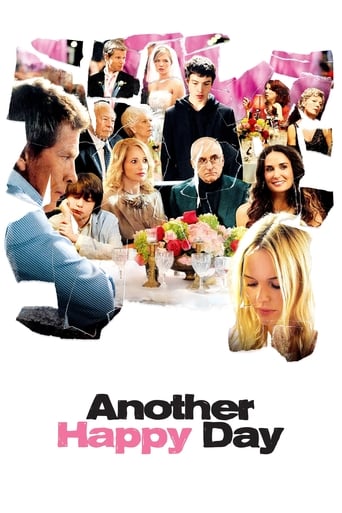Desertman84
Another Happy Day is a black dramedy that features an ensemble cast such as Ellen Barkin, Kate Bosworth, Ellen Burstyn, Thomas Haden Church and Demi Moore.It is all about a dysfunctional family that gathers together on a family weekend.One weekend,every family member gathers together at the Annapolis estate of Lynn's parents for the discussion of the marriage of her eldest son Dylan,who accompanied by his three younger children.Lyn's other children,Elliot and Alice arrives as well having issues of their own with the former who isn't really in a good relationship with her mother and the latter having a hard time fighting her demons.Worse things happen when Lynn is demanded to be heard by her parents and her judgmental sisters as well by her ex-husband Paul and his second wife,Patty.The film was difficult to watch since everyone - let me repeat that everyone - is dislikeable and unbearable. It isn't funny considering that many viewers see films to relax and enjoy a good movie.Unfortunately,the people in it add stress to the viewer.What also is unrealistic is the fact that everyone seem to hate each other and managed to live in the same roof.Despite having talented actors and actresses involved in it,they are unable to lift it from being a poor movie into at least an average one.Finally,the good screenplay did not help as well as viewer could not feel nor empathize with the characters in it.
hopey5000
Watch and see people's real lives. The acting in this movie is superb, as one sees a group of dysfunctional people interact. A teenager with a drug problem is accurately if sadly depicted, as are friends, a mother confronting his problems but accomplishing little, indeed aggravating the issues.Perhaps the central point is how little some people know about interacting with others, as this dysfunctional family increases problems, aggravates family's members, and fails to understand one another.Yes, this is depressing and it may well hit a little too close to home. But if you want an emotional experience that leaves you understanding a little more about human experience, see this.This should win awards and I'd rank it as one of the top 100 movies of all time.
secondtake
Another Happy Day (2011)Another movie filled with inevitable clichés and a mixed bag of jokes and awkward comic encounters. It's nothing special, for sure, and because it seems to have some serious intentions it ends up being even more difficult to love. That said, it was nevertheless watchable because of the growing interplay between curious characters, and because of a couple of strong central performances.An odd but quick way to describe this movie is this: a Woody Allen farce about a contemporary apparently Jewish dysfunctional family in the rich suburbs somewhere on the Chesapeake, but without the grace and pointed brilliance of Allen's writing. It even begins with Allen-styled white on black text. And it's written and directed by the same person, Sam Levinson--who has probably gotten the chance for direct because his father Barry was so successful in Hollywood.What works is the bickering mayhem of a contemporary family. They are geographically dispersed but are reuniting for a wedding. Wayward children and ex-spouses all must encounter one another in what should have been (and sometimes is) a tense, hilarious, richly complicated scenario.The complicated part is there, at least. One of the characters is a son played by Ezra Miller who shows his torment, his dependence of substances of any and all kinds, and his sense of irony really well. The more famous actors like Ellen Burstyn give a strong presence on screen but have to work within the somewhat clumsy construction of the movie. Demi Moore makes a different kind of appearance and is successfully annoying without seeming to fake it one bit. Her husband is played by the ever daft seeming Thomas Haden Church. Throw in Kate Bosworth and a an aging (of course) George Kennedy and you can see how there are moments, or shards, of real potential here.It is rather the writing and the somewhat pushy melodrama that makes it wobbly even as the end tries to make the family gel. Maybe the movie is a sign of something better to come because it's an attempt at insight into the contemporary American scene. But the art of telling this kind of story, and of having actual insight instead of the appearances of such, need some serious work or maturity.
shandragore
Reading the professional critics' reviews of this powerful film is bewildering. Some of them perfectly reflect my sense of the deep truth it presents; others write it off as promising but fatally flawed.I want to focus on the painful (awful, even) sense of recognition I experienced as I watched. Early in my life I was profoundly and forever influenced by the writing of R. D. Laing, especially "The Politics of Experience." That title is much to the point here. I'm reminded of an old joke: Q. How many people does it take to have politics? A. Three, so that two of them can get together and talk about the other one. Laing portrays a world of interpersonal, ESPECIALLY familial, relationships in which violence is carried out, not in the realm of the physical, but in the realm of experience. He claims, and I say vividly demonstrates, that human beings routinely act with the purpose not merely of controlling others, but with the purpose of controlling how they experience themselves, their reality and the character of their oppressors. In Laing's terms, they are confronted with "forces of violence, masquerading as love."In these terms, "Another Happy Day" is dead on the mark: throughout the film Ellen Barkin's character is tormented by and struggles to overcome the mists and fog of the interlocking attitudes and prejudices that are the residual outcome of her family's progress through time. In terms of this struggle, she emerges as an existential heroine. More power to her; more power to all of us.








